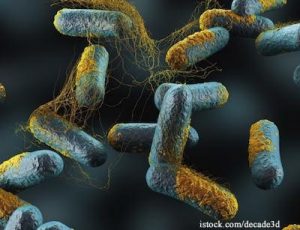A study conducted at Weill Cornell Medical College has found that a toxin produced by the bacteria Clostridium perfringens may be a trigger for the development of multiple sclerosis (MS), an autoimmune disease. The study was presented at the American Society for Microbiology meeting last week.
 Clostridium perfringens causes a million cases of foodborne illness every year in this country. The bacteria produces a toxin that the researchers found for the first time in MS patients.
Clostridium perfringens causes a million cases of foodborne illness every year in this country. The bacteria produces a toxin that the researchers found for the first time in MS patients.
Dr. K Rashid Rumah, the study’s first author, said in a statement, “this bacterium produces a toxin that we normally think humans never encounter. That we identified this bacterium in a human is important enough, but the fact that it is present in MS patients is truly significant because the toxin targets the exact tissues damaged during the acute MS disease process.”
Dr. Timothy Vartanian, professor of neurology and neuroscience at the College said, “while it is clear that new MS disease activity requires an environmental trigger, the identity of this trigger has eluded the MS scientific community for decades. Work is underway to test our hypothesis that the environmental trigger for MS lays within the microbiome, the ecosystem of bacteria that populates the gastrointestinal trace and other body habitats of MS patients.”
Clostridium perfringens is found in soil. Type A is commonly found in the human GI tract. But types B and D carry a gene that creates a toxin. This toxin travels through the blood to the brain, where it damages myelin, the insulating sheath that protects neurons. Before this study, the B type had never been found in humans.
In addition, stool samples from MS patients found that only 23% of them carried the healthy Type A Clostridium perfringens bacterium, compared to 52% of patients without the disease. The Type A bacterium competes with other subtypes in the GI tract, so it may be protective.
Drs. Vartanian and Rumah think that a vaccine may be developed against C. perfringens Type B. They are also hopeful that a “probiotic cocktail” may be able to deliver bacteria that “compete with, and destroy, C. perfringens types B and D. It would be such a beautiful and natural way to treat the gastrointestinal system and solve the problem.”
Image courtesy CDC




